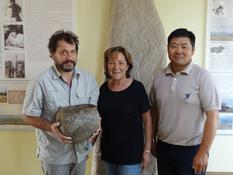- Homepage
- A la Une du Portail
- 12th Monaco-Mongolia archaeological dig Discovery of bronze cauldron more than 2,000 years old
12th Monaco-Mongolia archaeological dig Discovery of bronze cauldron more than 2,000 years old
The twelfth archaeological dig on the Mongolian steppe, led jointly by the Museum of Prehistoric Anthropology in Monaco and the Mongolian Academy of Sciences, resulted in some significant discoveries (bronze arrowheads, ceramics and bones). The most remarkable find, dating from more than 2,000 years ago, was a bronze cauldron.
During excavation of a tomb at the Tsatsyn Ereg site, archaeologists discovered a bronze cauldron containing a wooden spoon. According to scientists, this object, dating from the second century B.C., was interred close to a human body along with a series of other objects in a pit three metres deep, most likely the grave of one of the nomadic horsemen who crossed the Great Wall of China to spread terror among the Chinese garrisons. The contents of the cauldron will be examined extremely carefully in the laboratory to remove the tool and attempt to identify traces of any substances present.
Funded since 2006 by the Prince’s Government, the joint Monaco-Mongolian missions, under the high patronage of H.S.H. Prince Albert II of Monaco and under the aegis of UNESCO, are conducted each summer by teams led by Jamyian-Ombo Gantulga, Head of the Institute of Archaeology of the Mongolian Academy of Sciences, and Jérôme Magail from the Museum of Prehistoric Anthropology in Monaco.
The two teams cooperate at three sites in Arkhangai Province: Khunnu de Gol Mod, the Buddhist monastery of Zayan Khüree and the Bronze Age necropolis at Tsatsyn Ereg, where a research and exhibition centre was built two years ago thanks to support from the Prince’s Government.
Elisabeth Gramaglia Gondeau, Mongolia’s Honorary Consul to Monaco, paid her third visit to the Tsatsyn Ereg site, which, as a result of the archaeologists’ work, has recently been added to the UNESCO World Heritage Tentative List.
Autres actualités du thème

Monaco Yacht Show 2025 : modalités d’accès au Port Hercule pour les embarcations

18ème édition du Mondial du Théâtre - Les trois coups seront frappés mercredi 20 août pour une semaine de festival

E-scooters and e-bikes: harmonised regulations to better protect young users







